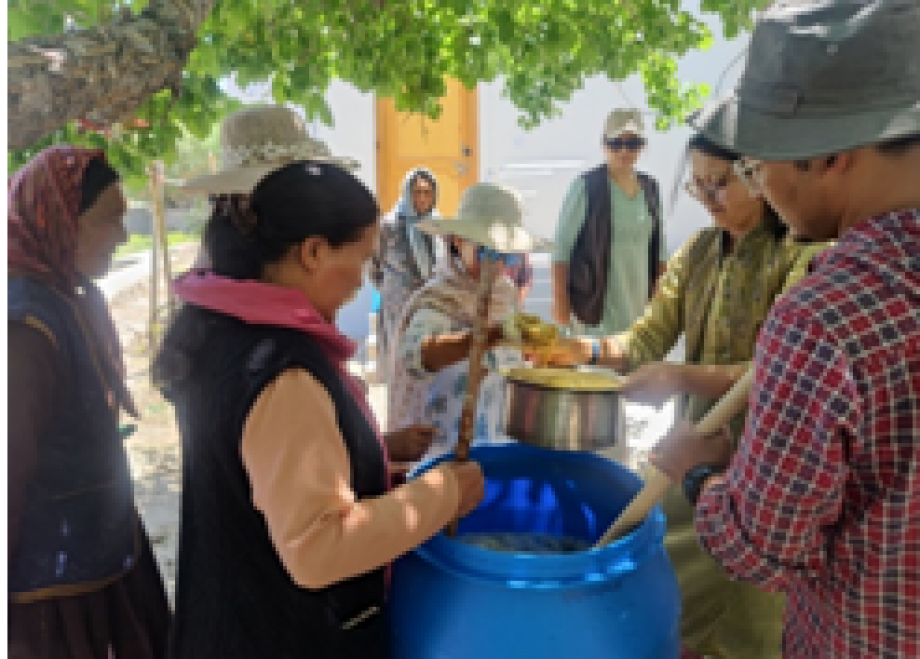Jeevamrit: A Farmer's Recipe for Free Fertility

Jeevamrit is a fermented organic liquid fertilizer which uses cow dung and urine, and some simple ingredients to create a powerful microbial culture that revitalizes soil health, eliminates the need for chemical inputs, and boosts crop resilience naturally. This traditional, fermented organic liquid fertilizer is the cornerstone of natural farming, designed not to feed the plant directly, but to rejuvenate the very life of the soil. By boosting the population of beneficial microbes, Jeevamrit unlocks nutrients for plants, suppresses soil-borne diseases, and creates a thriving ecosystem beneath our feet—all for a fraction of the cost of chemical alternatives.
Note: Jeevamrit is just one component of natural farming which is now being promoted by government of India under the flagship programme ‘National Mission on Natural Farming’ to encourage organic/traditional farming throughout India.
Table: Ingredients needed for preparation of Jeevamrit (the quantity presented in the table is in accordance with 200 L of water).
|
S.No. |
Ingredient |
Quantity |
Purpose |
|
1. |
Water |
180 litres |
Base of the solution |
|
2. |
Cow Dung |
10 kg |
Source of beneficial microorganisms |
|
3. |
Cow urine |
10 litres |
Natural biocide & rich in minerals |
|
4. |
Jaggery (Kuram) |
2 kg |
Food for microbes to multiply |
|
5. |
Besan |
2 kg |
Protein source for microbes |
|
6. |
Undisturbed soil |
1 fistful |
Inoculates with local microbes |
|
7. |
Plastic barrel |
1 (200L) |
Container for brewing |
|
8. |
Gunny bag |
1 |
To cover the final solution |
The Brewing Process: A Step-by-Step Guide
Creating Jeevamrit is a ritual of patience and care. Follow these steps precisely for the best results.
1. Base Preparation: Begin by filling 200-litre plastic barrel with approximately 180 litres of water. In a separate container, take some lukewarm water and thoroughly dissolve 2 kg of jaggery and 2 kg of besan into a smooth, lump-free slurry. Transfer this to the barrel and mix thoroughly.
2. Adding Key Components: To this 180 litres of water, add 10 kg of fresh cow dung and the 10 litres of cow urine. Cow urine should always be collected in a plastic container as it tends to react with metals.
3. The Final Ingredient: Add one fistful of undisturbed soil/soil from underneath a tree to this barrel. This ensures diversity in microbial population.
4. Thorough Mixing: Using a long, clean wooden pole, mix all the ingredients in the barrel vigorously. It is important to stir the solution in a clockwise direction. This action creates a vortex that pulls and settles the essential microbes towards the bottom of the barrel, ensuring they are well-integrated.
Crucial Tips for Success
• Location: Keep the barrel under a shade to protect it from direct sunlight and extreme temperature fluctuations.
• Aeration: Stir the solution three times a day—morning, afternoon, and evening—always in a clockwise direction. This aerates the mixture, which is vital for the aerobic fermentation process.
• Covering: The barrel should never be kept completely open, as flies and pests may lay eggs in it. Conversely, it should not be sealed airtight with a lid, as this would cut off the oxygen supply crucial for the beneficial microbes. A loose cover or a cloth preferably a gunny bag placed over the top is perfect.
• Curing Time: Depending on the environmental conditions, the Jeevamrit will be ready in 10 to 14 days. The tell-tale sign is a distinct, sweet-and-sour fermented smell and the disappearance of the foul odour of raw dung.
Importance of Jeevamrit
Unlike chemical fertilizers that degrade soil health, Jeevamrit rejuvenates it holistically. It introduces beneficial microbes that improve soil structure, water retention, and nutrient availability. This builds long-term fertility and resilience, eliminating dependency on costly external inputs and toxic residues, making it the true foundation of organic farming.
Jeevamrit and Ladakh’s Organic Ambition
The Government of Ladakh's visionary goal to become a fully organic region makes Jeevamrit a fundamental pillar for success. For local farmers, it is a powerful solution that cuts dependency on expensive, imported chemical fertilizers, drastically reducing costs and boosting self-reliance. It builds healthy, water-retentive soil—a critical advantage in our cold desert—leading to more resilient crops. This practice allows farmers to produce premium, chemical-free organic produce for a growing market, ensuring the long-term health of our land and water for future generations.
The authors Dr. Jigmet Namgial is YP-II, MIDH, KVK-Leh and Dr. Kunzang Lamo is a Scientist, SMS (Vegetable Science), KVK-Leh. You can mail your comment and feedback on Jigmetnamgial1@gmail.com and kunzanglamo@gmail.com





